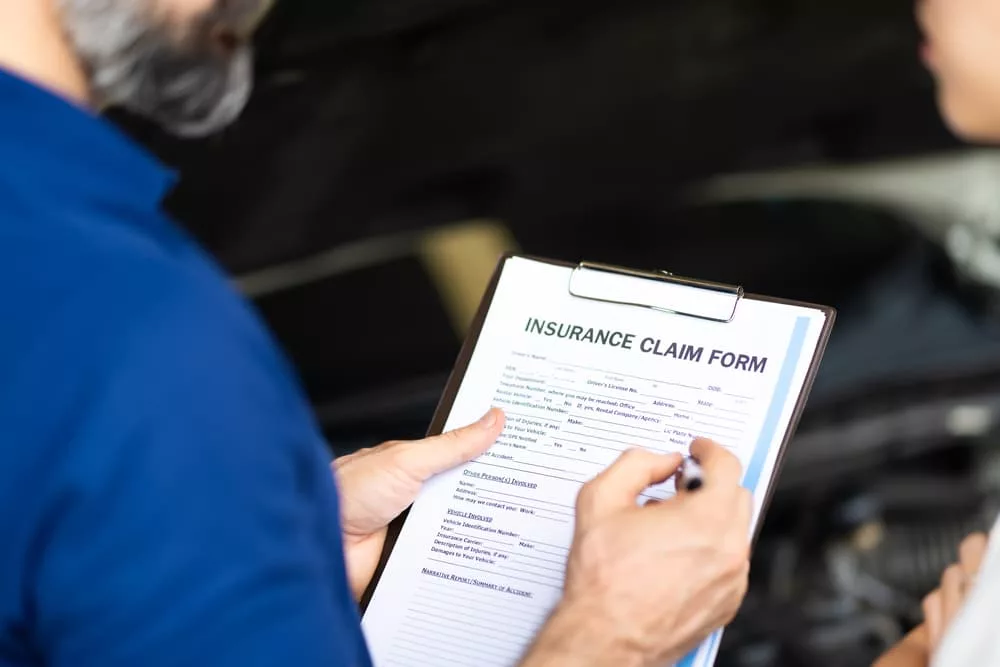Can I Sue After My Car Accident?
Yes, you can sue the person responsible for your injury after a car crash. However, negotiating an adequate settlement during a claim with the at-fault driver’s insurance company is possible. The insurance adjuster might be willing to settle if liability is clear. That means the evidence proves their policyholder caused the accident and should be financially responsible for your injuries and resulting losses.
You need a lawyer who knows when filing a lawsuit is necessary and how to handle the process. You should not sue the other driver or another liable party until you explore other options and consult an experienced car accident lawyer.
When Should I Sue Someone After a Car Accident?
Deciding to sue someone personally after a car wreck is a significant step in the legal process. It takes time to investigate the accident, obtain evidence, and prepare for a trial. That’s why attempting to settle your claim with the insurance company first is crucial. You can gauge how much they’re willing to pay and whether it’s enough to compensate you for your losses. If you’re happy with their settlement offer, you can avoid the costs and responsibility of handling a lawsuit.
If the settlement offer is too low and the insurance adjuster clearly communicates their intention not to increase the offer, exploring other options might be necessary. Recognizing when it’s appropriate to proceed with a lawsuit is essential to avoid accepting compensation that doesn’t cover your medical treatment and other expenses.
You might file a car accident lawsuit if:
- Liability isn’t clear. If liability isn’t clear after a car accident, it might be difficult to prove who was responsible for the crash. In such cases, filing a lawsuit against the at-fault party could be the best course of action. A lawsuit can help determine liability by giving you the opportunity to present evidence and testimony leading to a fair outcome.
- The insurance company offers a low settlement. Bringing legal action against the at-fault party in civil court should be the next step if the insurer’s settlement offer is too low. You must consider whether accepting their offer will compensate you for all your losses. If not, you can file a lawsuit and try to recover higher compensation from the insurance company and the negligent driver.
- You have expensive bills. The severity of a car accident can affect the amount of compensation owed to you by the negligent party. More severe injuries typically mean higher medical bills. If you require treatment even after the case ends, the money you receive must pay those expenses. You can sue the other driver if their insurer doesn’t account for your future medical bills and other costs while negotiating a settlement.
- The insurance company denies your claim. The insurance carrier might deny your claim preventing you from participating in settlement negotiations. If you know someone else is at fault for your injury and should be liable, filing a lawsuit is the only other option to recover the financial award you deserve. The insurer might disagree with your doctor’s diagnosis or the evidence of liability you present. However, you can challenge their decision by bringing them to court and presenting evidence to the judge or jury to support your case.
An Overview of Personal Injury Protection in Florida
In Florida, before you can file a lawsuit against the at-fault party, you must use the personal injury protection (PIP) coverage from your own insurance policy to cover your medical expenses. You can also use your PIP coverage for lost wages up to your policy limits.
You must show proof of PIP coverage to register a vehicle with at least four wheels in Florida.
Every vehicle with a current Florida registration must have:
- Personal injury protection and property damage liability (PDL) when registering the vehicle
- A minimum of $10,000 in PIP and $10,000 in PDL coverage
- A policy from an insurance company licensed to do business in the state
- Continuous coverage, even if the vehicle is inoperable or not driven by the policyholder
- Continuous insurance coverage during the registration period, regardless of the location of the vehicle
PIP benefits apply regardless of who is at fault for a car accident.
Coverage also benefits other individuals besides the policyholder, including:
- Children
- Members of the household
- Passengers who don’t have PIP insurance
The policyholder can use their PIP coverage if they’re injured in a crash while riding a bike or as a pedestrian.
PIP insurance provides two primary benefits—medical benefits and disability benefits.
Medical Benefits
Medical benefits cover 80 percent of all reasonable expenses up to the policy limit if the service relates to medically necessary treatment from the accident, such as:
- X-rays
- Medical
- Dental
- Surgical
- Rehabilitative services
If initial medical care occurs within fourteen days of the car wreck, PIP will cover additional services, such as medically necessary hospitalization, nursing, ambulance services, and prosthetic devices.
Medical benefits reimburse the covered individual for expenses related to:
- Initial services and care by a dentist, physician, chiropractic physician, or an advanced practice registered nurse
- Services provided in a hospital or facility owed by a hospital
- Initial services and care by a person or entity licensed to provide emergency treatment and transportation
Coverage for follow-up care referred by a physician, dentist, registered nurse, or another authorized provider applies if the service includes:
- Hospital or ambulatory surgical center
- An entity owned by one or more physicians, advanced practice registered nurses, chiropractic physicians, or dentists
- An entity owned by a hospital or hospitals
- Physical therapist
- Healthcare clinic
A qualified healthcare professional must determine the injury is an emergency medical condition (EMC) for PIP to provide the full $10,000 coverage. If the injury is not an EMC, only $2,500 in coverage is available.
Disability Benefits
Disability benefits cover up to 60 percent of lost gross wages and earning capacity if the injury causes an inability to work. PIP also pays additional expenses related to the accident, such as childcare or household chores the policyholder can’t perform due to their injury. The insurance company must provide payments at least every two weeks.
Serious Injury Requirement to File a Lawsuit
The minimum required limit of $10,000 often isn’t enough to compensate for all medical bills and lost wages. PIP also doesn’t cover non-economic losses such as pain and suffering. You might be eligible to file a third-party claim or lawsuit against the at-fault driver. However, you must exhaust your PIP limits first and meet the serious injury threshold.
That means your injury consists in part or whole of:
- Permanent and significant scarring or disfigurement;
- Permanent injury within a reasonable degree of medical probability except for scarring or disfigurement;
- Permanent and significant loss of a vital bodily function; or
- Death.
When you file a third-party claim or lawsuit, the money you receive might compensate you for losses such as:
- Lost earnings
- Future lost earnings
- Out-of-pocket expenses
- Physical therapy, hospitalization, prescriptions, and other medical costs
- Pain and suffering
- Inconvenience
- Loss of enjoyment of life
- Emotional distress
- Property damage
You should hire a car accident attorney to help you with your PIP claim and advise whether your injury meets the definition of a serious injury. Filing a third-party claim or lawsuit is complex. If you don’t understand your rights or state law, seeking compensation beyond your PIP insurance will be confusing and stressful.
Common Reasons Car Accident Claims Don’t Settle
Car accident cases often settle without litigation. However, resolving some claims is only possible by suing the insurer and at-fault driver.
Common reasons car accident claims don’t settle and require filing a lawsuit include:
- The insurance company blames you for partially or wholly causing the crash
- Multiple parties might be liable
- The insurer’s doctor and your doctor disagree on the type or severity of your injury
- The insurance company acts in bad faith
- The other driver disputes the liability
- A government entity is liable for the collision
Insurance companies always look for valid reasons to reduce the value of claims to save money. They want to avoid significant payouts by denying claims or providing lowball settlement offers. They conduct independent investigations and locate evidence to try to discount the severity of the injury or blame the accident victim for what happened.
Experiencing pushback from the insurer means it might be time to consider filing a lawsuit. Negotiating a full and fair settlement won’t happen if the insurance company isn’t willing to negotiate.
How Much Time Do I Have to File a Lawsuit?
You must comply with strict laws if you want to sue someone for the injuries they cause in a car crash. A statute of limitations is a law that dictates the timeframe one party has to bring action against another party after an accident.
In Florida, the statute of limitations allows a four-year period to file a lawsuit. That means you have four years from the accident date to initiate your lawsuit against the negligent driver or another liable party.
If you file suit after the required four-year period passes, the defendant will likely file a motion to dismiss, and the judge will dismiss the case, so you can’t proceed with litigation. You don’t have other options to seek compensation for your injury if you miss the deadline to file suit.
Factors Affecting the Statute of Limitations
Some exceptions allow you to toll the statute of limitations. That means you can pause or extend the four-year timeframe for filing suit.
You can’t toll the statute unless one of these factors apply to your case:
- Adjudicated incapacity. When a person has been legally determined not competent to manage their affairs, they have an “adjudicated incapacity.” If adjudicated incapacity applies when you get hurt in a car accident, you have four years from the date you gain mental competency to file suit. However, you can’t initiate your lawsuit more than seven years after the crash date.
- Minor. If you are a minor at the time of the accident, you must file your lawsuit within four years of the date you turn 18.
- Out of state. If the defendant leaves Florida before you can initiate a lawsuit, their absence won’t count toward the four-year period.
How to Sue the Government After a Car Accident
Some governmental entities and employees are responsible for maintaining roadways. They must repair potholes, replace damaged or missing signs, and complete other tasks to ensure the safety of drivers and passengers.
Typically, sovereign immunity prohibits a person from bringing a civil action against the government.
However, state law waives sovereign immunity and allows filing a lawsuit against a state government or its employee if:
- The injury is due to a wrongful act, negligence, or omission
- The employee acted in the scope of their work
- The circumstances would allow the injured party to hold the negligent agency or employee liable if they were a private party
There are some limitations to suing a government agency or employee, including:
- You can’t hold a government employee personally liable unless they intentionally injured you. Instead, you must file your lawsuit against the government agency or body that employs them.
- Punitive damages or interest accrued before the court enters a legal judgment isn’t allowed in a case against the state government.
- Compensation cannot exceed $200,000, or if the claim involves multiple state entities, the financial award can’t exceed $300,000.
- The state has the right to file an appeal to reverse the court’s ruling in a case against the government.
- Suing a state university requires filing the lawsuit in the county where the campus sits unless the university has a substantial presence in the county where the car accident occurred.
Lawsuits against the government require taking specific steps and meeting various requirements. They differ from lawsuits against individuals and companies. You must send the agency and the Department of Financial Services a written notice of claim within three years of the accident date.
The agency must respond within thirty days of receiving the notice. However, they can spend up to 180 days investigating the claim to determine its decision. If the agency denies the claim, you can file a lawsuit after the 180-day investigation period passes. Reach out to a personal injury lawyer.
Related articles
Related articles Related articles Related articles Related articles Related articles Related articles Related articles Related articles Related articles Related articles
Car Accident
18 Jan 2024
Who Is Liable if a Road Hazard Causes a Car Accident?

Car Accident
16 Jan 2024
How to File a Car Accident Claim as a Passenger




